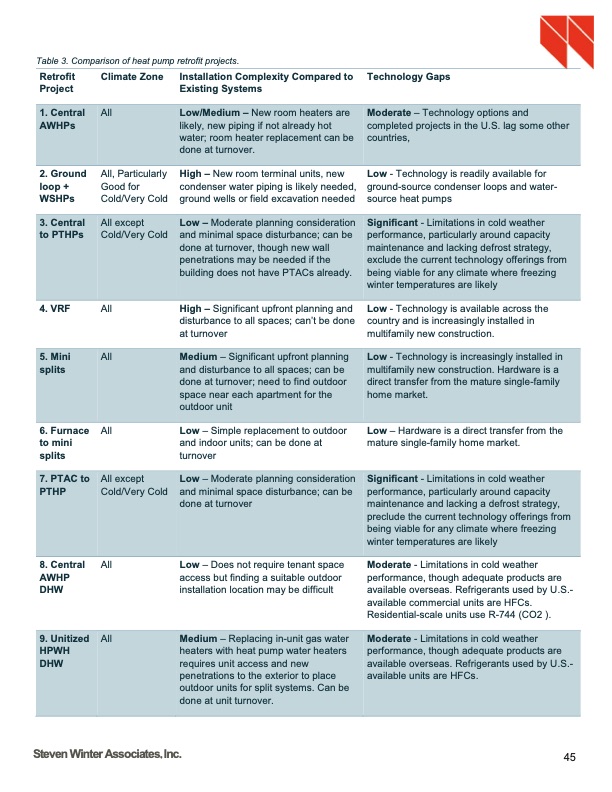
PDF Publication Title:
Text from PDF Page: 045
Table 3. Comparison of heat pump retrofit projects. Retrofit Project 2. Ground loop + WSHPs 4. VRF 6. Furnace to mini splits 8. Central AWHP DHW Climate Zone All, Particularly Good for Cold/Very Cold All All Installation Complexity Compared to Existing Systems High – New room terminal units, new condenser water piping is likely needed, ground wells or field excavation needed High – Significant upfront planning and disturbance to all spaces; can’t be done at turnover Low – Simple replacement to outdoor and indoor units; can be done at turnover Low – Does not require tenant space access but finding a suitable outdoor installation location may be difficult Technology Gaps Low - Technology is readily available for ground-source condenser loops and water- source heat pumps Low - Technology is available across the country and is increasingly installed in multifamily new construction. Low – Hardware is a direct transfer from the mature single-family home market. Moderate - Limitations in cold weather performance, though adequate products are available overseas. Refrigerants used by U.S.- available commercial units are HFCs. Residential-scale units use R-744 (CO2 ). 1. Central All Low/Medium – New room heaters are AWHPs likely, new piping if not already hot water; room heater replacement can be done at turnover. Moderate – Technology options and completed projects in the U.S. lag some other countries, 3. Central All except Low – Moderate planning consideration to PTHPs Cold/Very Cold and minimal space disturbance; can be done at turnover, though new wall penetrations may be needed if the building does not have PTACs already. Significant - Limitations in cold weather performance, particularly around capacity maintenance and lacking defrost strategy, exclude the current technology offerings from being viable for any climate where freezing winter temperatures are likely 5. Mini All splits Medium – Significant upfront planning and disturbance to all spaces; can be done at turnover; need to find outdoor space near each apartment for the outdoor unit Low - Technology is increasingly installed in multifamily new construction. Hardware is a direct transfer from the mature single-family home market. 7. PTAC to All except Low – Moderate planning consideration PTHP Cold/Very Cold and minimal space disturbance; can be done at turnover Significant - Limitations in cold weather performance, particularly around capacity maintenance and lacking a defrost strategy, preclude the current technology offerings from being viable for any climate where freezing winter temperatures are likely All 9. Unitized HPWH DHW All Medium – Replacing in-unit gas water heaters with heat pump water heaters requires unit access and new penetrations to the exterior to place outdoor units for split systems. Can be done at unit turnover. Moderate - Limitations in cold weather performance, though adequate products are available overseas. Refrigerants used by U.S.- available units are HFCs. Steven Winter Associates,Inc. 45PDF Image | HEAT PUMP RETROFIT STRATEGIES FOR MULTIFAMILY BUILDINGS

PDF Search Title:
HEAT PUMP RETROFIT STRATEGIES FOR MULTIFAMILY BUILDINGSOriginal File Name Searched:
heat-pump-retrofit-strategies-report-05082019.pdfDIY PDF Search: Google It | Yahoo | Bing
CO2 Organic Rankine Cycle Experimenter Platform The supercritical CO2 phase change system is both a heat pump and organic rankine cycle which can be used for those purposes and as a supercritical extractor for advanced subcritical and supercritical extraction technology. Uses include producing nanoparticles, precious metal CO2 extraction, lithium battery recycling, and other applications... More Info
Heat Pumps CO2 ORC Heat Pump System Platform More Info
| CONTACT TEL: 608-238-6001 Email: greg@infinityturbine.com | RSS | AMP |